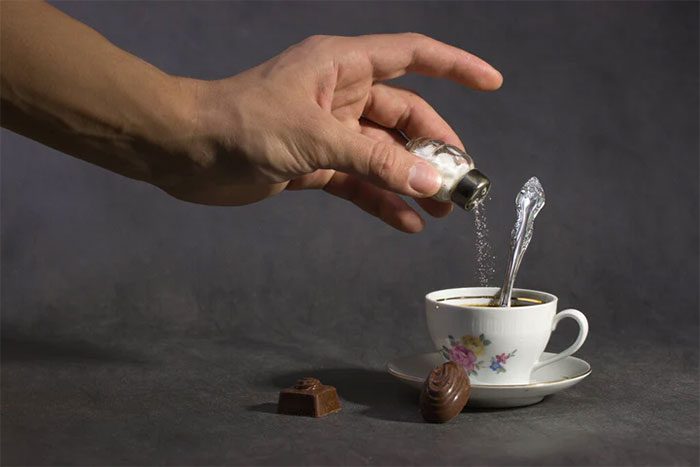Many people often add sugar or milk to their coffee to mitigate its bitterness. However, this not only masks the drink’s flavor but also adds unnecessary fats to our bodies.
Enjoying a delicious cup of coffee is subjective; some prefer Irish coffee (espresso combined with whiskey) in the evening, but you should try salty coffee in the morning—it may offer you a unique experience.
From a scientific perspective, this idea is quite beneficial for health.
Several studies indicate that salt not only softens the bitterness of coffee but also enhances other flavors within the beverage.

Adding a pinch of salt to your coffee is a clever trick that reduces bitterness while enhancing other flavors. (Image: Science et vie).
Salt “hides” the bitterness of coffee
Sodium chloride (table salt) is commonly used to eliminate bitterness from various foods. Throughout culinary history, salt has been used to highlight the flavors of dishes.
In 1995, a study demonstrated that salt effectively “masks” bitterness.
When you drink a cup of coffee that is slightly sweet yet overly bitter, adding a pinch of salt can make your coffee taste sweeter and less bitter.
Why is that?
The human tongue has four taste zones responsible for distinguishing basic flavors, including bitter, sweet, sour, and salty.
Research suggests that salt enhances other flavors.
However, bitterness on the tongue operates differently.
Instead of reacting normally on the tongue, taste buds release a calcium ion and send a “bitter” signal to the brain.
Therefore, when we drink coffee with a little salt, both the bitter and salty tastes are activated simultaneously, causing the salty flavor to prevent the brain from detecting bitterness while stimulating other taste sensations like sweetness.
Scientists note that at higher concentrations, salt activates the bitter and acid receptors TASR2.
This flavor combination can be particularly unpleasant, so we only need to add a little salt to reduce bitterness, rather than overdoing it.
The roasting process determines coffee’s bitterness
In a cup of coffee, its bitterness is directly affected by the roasting process, which leads to the formation of compounds known as chlorogenic acid lactones.
Light roasting results in a more acidic coffee, while dark roasting leads to increased bitterness in the mouth.
This is due to the metabolism of chlorogenic acid forming phenylinants. These compounds contribute to coffee’s bitterness. Consequently, in many countries where coffee is roasted dark, it is likely that salt is added to the brew.
For instance, in Vietnam, salty coffee is often paired with condensed milk to create a drink with a slight caramel flavor.
Another famous tradition in Sweden is the drink “kokkaffe”—coffee served alongside dried, smoked reindeer meat.
Ultimately, adding a pinch of salt to your coffee is especially useful when you’ve over-extracted the coffee, resulting in extreme bitterness.





















































